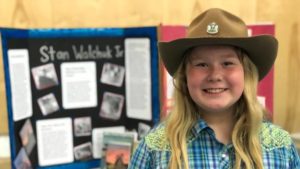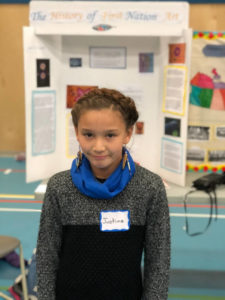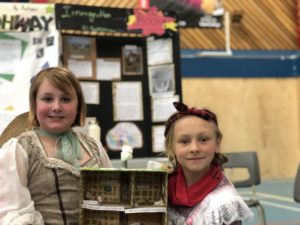Topics of research include arts, culture, Canadian heroes and history

Alix Walchuk wanted to learn more about her uncle Stan Walchuk Jr., somebody who everybody else in her family, it seemed, knew everything about.
“I was like, ‘why don’t I know about him,'” said Walchuk, a Grade 5 student at Jack Hulland Elementary School. “So I decided to do research on him, read all of his books and I was like, ‘I really like this.'”
Her Uncle Stan hitchhiked to Yukon, she said, when he was only 16 and with only $16 in his pocket. He then went on to write an autobiography.
“I read the book, all 600 pages of it,” she said, “It was really interesting, it’s my favourite book.”
Walchuk’s interest in her uncle was motivated into action by a school assignment to explore an aspect of Canadian heritage.
The Yukon/Stikine Regional Heritage Fair is now in its 20th year.
“Every year I’m amazed at what these kids come up with.” –
– Leighann Chalykoff, fair coordinator
It is an education initiative that sees students in Grades 4 to 8 from across the territory and Atlin, B.C., create research projects on an aspect of history they choose.
“Every year I’m amazed at what these kids come up with and how much work goes into these projects, they really go above and beyond,” said coordinator Leighann Chalykoff.
“The really amazing thing about the Heritage Fair is it’s not one thing, heritage is really everything: who we are and where we came from in the Yukon.”
Chalykoff says it’s not just what’s written in a history book.
“It’s talking to our families, it’s talking to the elders in the community, it’s learning about our environment and our traditional knowledge.”
History of First Nations Art
For Carmacks student Justine Bellmore-Smarch, the Heritage Fair presented an opportunity to learn more about First Nations art.

Both her mother and grandmother are artists and Bellmore-Smarch says it’s an important part of culture.
She adds that learning how many natural materials were used to create the art was one of the most interesting elements of the project.
“To make paint they would smoke salmon roe for a day and then they would chew it up and spit it into a container,” said Bellmore-Smarch.
“They would add crushed red ocher to make red, to make black they would use charcoal and for white paint they would use baked and crushed clam shells.”
Marshmallow Vimy Ridge
In Dawson City, the Heritage Fair gave student James Taylor a chance to not only learn more about the Battle of Vimy Ridge, but also about his ability to craft.
For his project he cut out chunks of Styrofoam to replicate the war trenches, completing the model with mini-marshmallows as sandbags.
Taylor says while the crafting element of the project was fun, it was the Yukon’s involvement in the First World War that piqued his interest the most.
“It was a victory for Canada and the Yukon,” said Taylor. “The Yukon put a lot of money into it with the Yukon battery and the backpack.”
Immigration Boom
Hidden Valley school students Cadence Hartland and Sophie Gagner came together to learn more about the immigration boom in Alberta during the late 1800s.

For their project there was flashing red lights, period costumes and even homemade butter, they churned themselves.
“We learned so much about just how hard it was ending up in Alberta and really having nothing,” Hartland says.
For Gagner, who is in Grade 4, the project gave her a close glimpse into her own family history.
“I actually learned that my great grandmother was a Mennonite from Russia,” said Gagner. “She just died in December so finding that out is pretty cool because I had no idea.”
This year’s fair featured 44 projects presented by 58 students from across the Yukon and Atlin, B.C..


